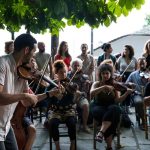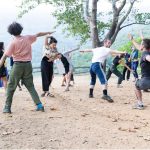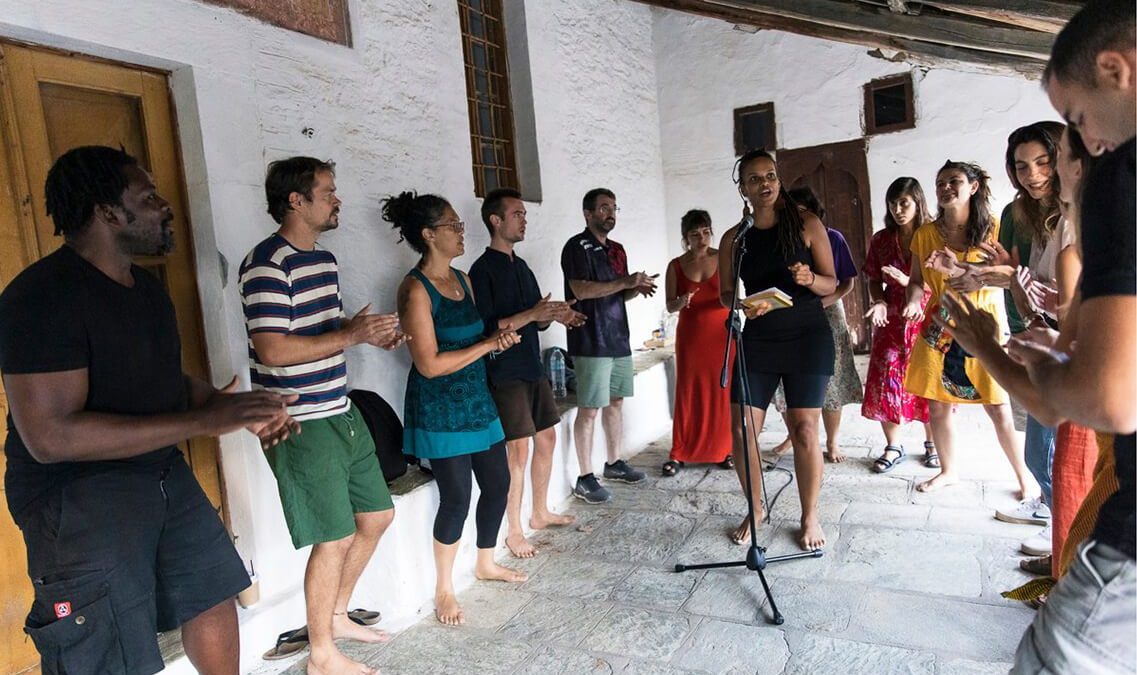
Musical Workshop οn Makam Improvisation (Taksim)Michalis Kouloumis
17 March 2023
Polyphonic Body: The Radiant StorytellerJulianna Bloodgood & Rafał Habel
17 March 2023Polyrhythmic voice, spoken word and narration
Percussion and storytelling workshop
Coordination: Michael Afolayan
Duration: 30 hours
Language: English, Greek
25 - 31 August
(25.8 welcome date / 31.8 departure date)

African rhythms are the result of a collective memory that was born to express the connection of humans with the natural environment.
They have something sacred. They are associated with rites passages and earth ceremonies that are connected with fertility and some rhythms evoke the world of the spirits. Thanks to the oral tradition of west Africa, and the numerous researchers from the fields of anthropology and ethnomusicology, there is in our disposal a vast source of different rhythms, from which we can tap into a collective past that was formed to create, strong bonds and empower a community to celebrate the joy of life.
When we speak about drumming, what we know, is that it has to do with the beating of a drum, with our bare hands and playing some rhythms, which is true but in order to explore and enhance our musical perception we will accept the drum as an amplifier of our voice, of our energy, behind the rhythms that the drum is playing actually it’s our voice that speaks. In fact, one of the functions that tribal drums had and in some parts of Africa still has, was that it was a form of actual communication they were speaking with the drums in their own dialect, African language is tonal based on the notes do- re- mi.
African language itself is a music score, in conclusion the drums were expressing and transmitting thoughts and ideas, emotions, quotations, and proverbs, when the drummer speaks or sings the drum starts talking.
In this workshop our focal point will be to discover the essence of drumming, and the vessel for this journey is our voice and our body. The primal musical instruments of humanity.
The origins of African rhythms can be traced in a widespread community practice, which is also an oral tradition medium, and that is the practice of singing and clapping. What we will be actually doing, is chanting the rhythmic patterns in a way the rhythm itself becomes a mantra. While chanting the rhythms, in a repetitive way, we create a mantra that awakes our breathing mechanism and body movement, when our minds main focus is the rhythm it becomes silent, it speaks only the rhythm and observes, then we become the rhythm. This approach leads to a dynamic form of social meditation where the power of intention can lead to ecstasy, euphoria and brings people together.
At that point where we all come close we will introduce the narration, African myths and fairy tales short stories that will be adapted in such a way that the rhyme opens a space for the pulse of the image to emerge in the best possible way, we will recall the art of music narrators, who sought poetry, measure and verse, the rhyme, in an attempt to explore the musicality and rhythm of speech.
Basic ingredients of African rhythms is polyrhythmia. One rhythm is a combination of many small rhythms that are in dialogue. Symbolically speaking it depicts the different rhythms of human nature, the different rhythms of nature and how they intersect each other. It symbolizes the weaven matrix of the world.
In our case, polyrhythmia is equivalent with polyphonia, because we will be chanting rhythms and that will be our approach to the African rhythms which we will study and our medium for storytelling.


Michael Afolayan
Michael Afolayan is a musician, actor, performer, and animator. Founding member of the street theater troupe "Pantum", co-director of the model circus school, Circus dayz and manager of the cultural center of African art anasa where he teaches polyrhythms of West Africa (Djembe) using as a starting point, voice and body, from 2011 till today. He has Studied classical percussion with, K. Vorisi, K. Theodorako, M. Taliadouros ( Snare Drum, timpani , marimba). He has collaborated as an actor - musician with several directors and theatrical actors for the last 10 years - His parallel path in the art of storytelling , but also of hip-hop, make him quite experienced in rhythmic recitation and narration. And many times he is asked in performances to formulate a text with pure rhythmic conductions, which respects the energy and the pulse of the image-scene.
